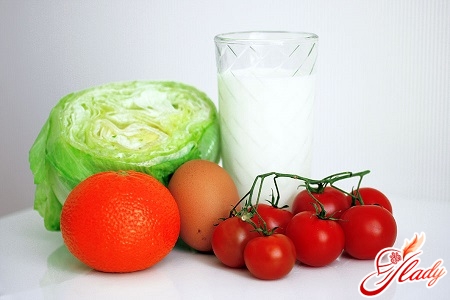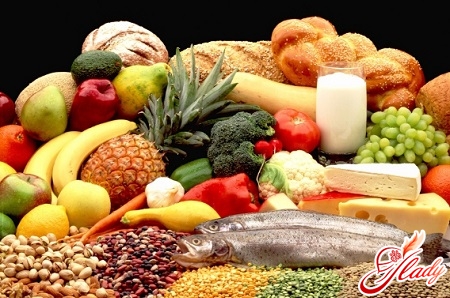
Food is for the human bodyenergy supplier, all resource costs are replenished only with its help. Proper nutrition is not only a guarantee of health, but also beauty. What kind of nutrition can be correct? Only balanced, where there is the correct combination of such useful substances as proteins, carbohydrates and fats, as well as vitamins and useful microelements. Each of these components performs a certain function in metabolism - a complex mechanism of our body. A balanced diet is the presence of 30% protein, 20% fat and 50% carbohydrates in a person's daily diet.
Protein functions: why do we need it
Protein is the most important material for processesrestoration and replacement of old cells with new ones. These processes occur in the human body constantly. The production of this substance in our body is impossible without amino acids, which are abundant in plant and animal proteins. Performing the building functions of cells and organs, protein, on the basis of which various compounds and hormones are created, along with glucose, is excellent food for the brain. Hair, nails, muscles, internal organs - our entire body works on this material. The main sources of protein are animal and plant products, such as cottage cheese, fish, meat and eggs. In the process of digestion and processing by the body, its original composition will differ from the one received. The fact is that the digestive process breaks down proteins into amino acids, which are used by the body to produce its own protein. The digestibility of plant proteins by the body is somewhat lower, naturally, compared to animal proteins (85% and 97%). In total, proteins are capable of synthesizing up to 30 types of amino acids, while 22 of which are considered essential, since the body itself cannot produce them. And the rest of the amino acids, as you already understand, are replaceable. Products with a high protein content include:
- Sturgeon caviar (28.9 g per 100 g of product);
- Beef (28 g per 100 g);
- Meat of turkey (25.4 g / 100 g);
- Canned "Tuna in its own juice" (23.5 g / 100 g);
- Shrimp (21.8 g per 100 g);
- Chicken breast (18.7 g per 100 g);
- Trout (17.5 g per 100 g);
- Low-fat curd (16.5 g per 100 g);
- Herculean porridge (13.6 g per 100 g);
- Chicken eggs (13 g per 100 g);
- Buckwheat groats (12.6 g per 100 g);
- Rice groats (7 g per 100 g);
- White beans in canned food (6.7 g per 100 g);
- Kefir (3 g per 100 g).
Regular consumption of proteins in foodpromotes the acceleration of metabolism. If you exclude them from the diet, the development and growth processes in children will slow down, and adults will experience multiple changes in the body, including: changes in the structure of the liver, a decrease in the level of absorption of useful and nutritious substances, a change in hormonal levels, deterioration in the functioning of the heart muscle, decreased performance and memory problems. Among other things, an insufficient amount of this substance in the human body reduces immunity, this happens due to a decrease in the production of antibodies, also causes vitamin deficiency, and provides soil for the development of inflammatory processes. On the other hand, an excess of protein does not threaten positive consequences either. Since our body cannot store this excess "in reserve", the liver has to work hard and process it into glucose, urea and other compounds for excretion from the body. When excreted from our body, calcium is lost, there is a risk of kidney stones and cancer. In order not to overdo it with protein and prevent its deficiency, it is important to know the required norm. The average protein level in the daily diet of an adult should be from 100 to 120 g, in cases where physical activity is quite high, it should be increased to 160 g.
Than useful fats: everything about this substance
The standard opinion about fats is very negative, theyare considered enemies of a slim figure, but in the right quantities they are simply necessary for our body and its normal functioning. Fats are one of the most powerful sources of energy. Fat deposits protect the body from bruises, injuries, prevent heat loss, and also serve as the main source of food when appetite disappears or there is no opportunity to eat. Edible fats are a combination of glycerol esters and higher fatty acids (there are two types: saturated and unsaturated). Saturated fatty acids are found in solid fats of animal origin, and unsaturated ones are found in seafood and liquid oils. The normal fat content in the body is 10-20%, with problems with metabolism, this figure increases to 50%. In the human body, fats are contained in cell membranes, sheaths of nerve fibers, participate in the process of synthesis of hormones, acids, bile and vitamins. Below is a list of some sources of fats:
- Boiled beef (16.8 g per 100 g);
- Boiled lamb (17.2 g per 100 g);
- Fried carp (11.1 g per 100 g);
- Sea bass (9.7 g per 100 g);
- Red caviar (13.8 g per 100 g);
- Milk 3.2% (3.2 g per 100 g);
- Cheese "Dutch" (26.8 g per 100 g);
- Margarine (82 g per 100 g);
- Liver of cod (65.7 g per 100 g);
- Halva sunflower (29.7 g per 100 g);
- Bitter chocolate (35.3 g per 100 g);
- Mayonnaise (67 g per 100 g);
- Butter (82.5 g per 100 g);
- Fatty kefir (3.2 g per 100 g).
It is essential to consume fat in food.With its help, proteins and vitamins (A, B, D and E) are absorbed, the nervous system is normalized, the elasticity and firmness of the skin is maintained, and useful minerals are absorbed from the intestines. Animal fats are absorbed worse than vegetable fats, but the body needs both of these types. With a balanced diet, an adult needs to consume 100 to 150 g of fat per day, and the ratio of vegetable fat to animal fat should be 30-40% to 60-70%. A lack of fat in the human body can lead to deterioration of the skin, disruption of cholesterol metabolism, the risk of developing atherosclerosis, slowing the growth and development of children, and suppression of the central nervous and reproductive systems. Excess fats should also be avoided, otherwise there is a risk of damage to the pancreas, liver, the development of cancer and gallstones. Excess fat accumulation also affects the figure and causes excess weight, since this component contains the most calories: 9 kcal per 1 g.
Useful properties of carbohydrates: why do we need them?
Carbohydrates are the main source of energy andthe building blocks of which the entire body is composed. In combination with proteins, they form the most important compounds, enzymes and hormones necessary for normal functioning. They can be conditionally divided into simple (monosaccharides: glucose, galactose, fructose and disaccharides: maltose, lactose, sucrose) and complex (pectin, fiber, starch, glycogen), as well as digestible and indigestible. Simple carbohydrates are quickly absorbed by the body and, entering the blood, saturate it with essential substances, if there is a need for this. If there is no such need, then an excess of carbohydrates (more than 30 is processed by the body into fats andis deposited as a reserve. These substances take an active part in the digestive system, having a beneficial effect on the absorption of micronutrients, in the synthesis of DNA, RNA and ATP molecules, and provide about 70% of the brain's energy expenditure. Sources of complex carbohydrates include pasta, potatoes, various cereals, bread, fruits and vegetables, and simple carbohydrates include sugar and all products based on it. The ratio of simple and complex carbohydrates in the daily diet should be 20% to 80%. Below are the main sources of carbohydrates.
is processed by the body into fats andis deposited as a reserve. These substances take an active part in the digestive system, having a beneficial effect on the absorption of micronutrients, in the synthesis of DNA, RNA and ATP molecules, and provide about 70% of the brain's energy expenditure. Sources of complex carbohydrates include pasta, potatoes, various cereals, bread, fruits and vegetables, and simple carbohydrates include sugar and all products based on it. The ratio of simple and complex carbohydrates in the daily diet should be 20% to 80%. Below are the main sources of carbohydrates.
- Green peas (13.3 g per 100 g);
- Potatoes (19.7 g per 100 g);
- Boiled corn (22.5 g per 100 g);
- Garlic (21.2 g per 100 g);
- Lentils (53.7 g per 100 g);
- Bananas (22.4 g per 100 g);
- Grapes (17.5 g per 100 g);
- Fresh rosehips (24 g per 100 g);
- Dried boletus (33 g per 100 g);
- Pearl barley (73.7 g per 100 g);
- Corn cereals (75 g per 100 g);
- Cashew (22.5 g per 100 g);
- Dates (69.2 g per 100 g);
- Creamy rusks (71.3 g per 100 g).
The daily carbohydrate content of food should benot less than 400-500 g. If there is a deficiency in the body, fatty degeneration of the liver may occur (fat deposition due to a decrease in glycogen reserves in it). Metabolism of proteins and fats is disrupted, harmful substances accumulate in the blood, ketones (coupled with increased oxidation of proteins and fats, a coma may occur due to poisoning of brain tissue and a change in the body's environment to acidic). If you have found the following symptoms: hand tremors, sweating, drowsiness, weakness, hunger, nausea, headaches, dizziness, this means that you have a very low level of carbohydrates. Sugar can normalize it. To avoid this, as you understand, you need to consume at least 100 g of carbohydrates per day. An increased level can lead to obesity and an increase in insulin. This occurs with the simultaneous intake of carbohydrate-rich foods, when the elements enter the blood and insulin is released to neutralize them, converting glucose into fat.
Balanced nutrition: how and what to eat
As we have already found out, no matter how useful andNo matter how nutritious the elements in food are, they must be consumed in the right proportions, otherwise you risk not only harming your appearance, but also your health. Not everyone can learn to eat right, below are tips that will help you start a healthy lifestyle. Breakfast should be nutritious. This is the first meal of the day, it will “get you on your feet” and charge you with energy until the next meal. Complex carbohydrates are great for this, such as whole-grain pasta, whole-grain bread, any porridge (except semolina), cabbage, kiwi, zucchini, apples and grapefruit. For lunch, combine proteins and carbohydrates. It is necessary to eat meat or fish for lunch, as well as greens. Dinner should be eaten no later than 3-4 hours before bedtime. You do not need to overload your stomach before bedtime. Dairy products, vegetables and fruits are great for dinner. Try to eat at the same time every day. There are no specific meal time recommendations, some people find it more convenient to eat every 2-3 hours, while others eat more often. The main thing in this case is to train your body to eat on schedule. Do not rush when eating. The faster you chew your food, the more you will eat. Perhaps every woman who dreams of losing weight remembers this. Nutritionists recommend chewing slowly, prolonging the pleasure. This ensures quick saturation and, as a result, preventing overeating. Water consumption should be regular. According to experts, you need to drink 30 ml per 1 kg of body weight per day. You do not need to do this forcibly, your body will tell you when and how much you need to drink. You should give up sweet drinks that are sold in all stores. Try to make your diet varied. It should include products from different food groups: proteins, fats, carbohydrates. Treat yourself only to healthy sweets. Confectionery products are undoubtedly a lot of fun, but they are extremely harmful to your figure. Replace them with fruits, dried fruits, pastilles, dark chocolate, marshmallows and marmalade. Eating large amounts of salt increases the risk of hypertension. You should never give up salt, dose it correctly and replace table salt with sea or iodized salt. You should eat only when your body tells you to. Avoid random snacks with friends and colleagues in cafes, at home in front of the TV and at the computer. You should eat only when you feel hungry. Following these simple and straightforward recommendations, you can switch to a healthy and balanced diet that will saturate your body with the necessary amount of proteins, fats and carbohydrates, and at the same time with energy, vitality and a good mood.









